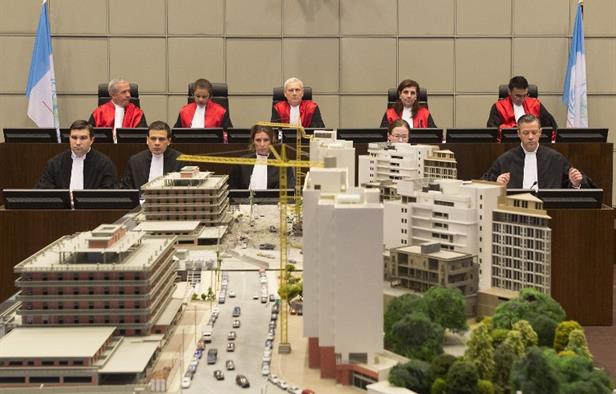What happens to Badreddine’s trial now?
Alex Rowell/Now Lebanon/May 13/16
Mustafa Amine Badreddine, whose death was announced Friday by Hezbollah in an official statement, was not merely a senior militant believed to be leading the Party of God’s operations in the Syrian warzone, among other prominent roles.
He was also the foremost of five suspects indicted by the Netherlands-based Special Tribunal for Lebanon for the assassination of former Lebanese Prime Minister Rafik al-Hariri.
His death raises questions about the fate of the Tribunal and the possibility of attaining justice for the victims of the February 14, 2005, bombing that killed Hariri along with twenty-one bystanders.
In a statement released Friday afternoon, the Tribunal declined to say what would happen to the case, known as Ayyash et al.
“The Special Tribunal for Lebanon takes note of the reports today in the media announcing the death of Mustafa Amine Badreddine,” read the statement.
“Pending a judicial determination, the STL is not in a position to make any comment on this announcement in the media.”
Asked by NOW which judiciary in particular was required to make this determination, STL spokesperson Wajed Ramadan said, “That will be a matter to be discussed. I really cannot provide any comment on that.”
The Tribunal’s rules state that any amendments to or withdrawals of indictments must be made in open court. The next Ayyash et al. court session is scheduled for Tuesday, May 17.
One of the matters that will have to be determined, according to independent legal sources, is whether or not Badreddine truly is dead—despite Hezbollah’s own confirmation published through its official news channels.
“The prosecution will stop the proceedings with respect to Mustafa Badreddine once the Tribunal has enough evidence that he passed away,” said Marwan Saqr, a Lebanese lawyer.
“[The defense] counsel should bring evidence that the person who is going to be buried today is the same person who is indicted for the Tribunal. So how would this happen? Probably it can be DNA samples, whatever, but they need to know with certainty that he is the one who died today.”
Asked by NOW whether the trial of the remaining four Ayyash et al. indictees was likely to continue, Saqr said, “Yes, of course, because these are separate.”
Dismissing a case against a deceased defendant has precedent in international tribunals. For example, the trial of former Serbian President Slobodan Milošević at the International Criminal Tribunal for the former Yugoslavia (ICTY), dubbed the “trial of the century,” was brought to a close after Milošević’s death in March 2006.
The news of Milošević’s passing and the subsequent termination of the trial were met with dismay by victims of his alleged crimes against humanity, who felt they were denied justice.
“His punishment could not bring back my son, but it would be a drop of satisfaction in a sea of pain,” said Kasim Cerkezi, six of whose family members were killed in a 1999 Serb attack.
A similarly abrupt end to the trial of Badreddine, if it happens, would likely produce similar resentment among many Lebanese. The prospect has revived criticisms of the Tribunal’s handling of the case from some legal experts.
“The STL would not be stuck with a deceased indictee if it had shown the necessary courage to indict the real commanders: namely the Syrian president and his close aides, without whose orders a child knows that Mustafa Badreddine or any other apparatchik would have never dared consider the assassination of our former PM,” said Dr. Chibli Mallat, an international lawyer noted for bringing indictments against figures including Ariel Sharon, Moammar Qadhafi and Saddam Hussein, in an email to NOW.
“[Moreover], Mr. Badreddine would still be alive if he had accepted the jurisdiction of the STL and fought his case in open court.”

















